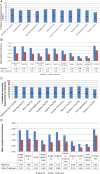Using best practice to create a pathway to improve management of irritable bowel syndrome: aiming for timely diagnosis, effective treatment and equitable care
- PMID: 27761233
- PMCID: PMC5036211
- DOI: 10.1136/flgastro-2016-100727
Using best practice to create a pathway to improve management of irritable bowel syndrome: aiming for timely diagnosis, effective treatment and equitable care
Abstract
Background: Irritable bowel syndrome (IBS) costs the National Health Service almost £12 million per annum. Despite national guidelines advising primary care management, these have failed to stem secondary care referrals of patients with likely IBS for unnecessary and costly assessment and investigation without necessarily achieving resolution of their symptoms.
Methods: In 2011, an integrated team from primary and secondary care developed a business case using baseline data to create a Somerset-wide IBS pathway using Clinical Commissioning Group funding. This provided face-to-face general practitioners (GP) education, developed a diagnostic pathway and funded faecal calprotectin (FC) testing to exclude inflammatory pathology for patients aged 16-45 years with likely IBS and no alarm symptoms. For those with FC≤50 μg/g, we provided a management algorithm and community-based dietetic treatment. Audit results measured usage and outcomes from FC testing, changes in patterns and costs of new patients reviewed in gastroenterology outpatients and dietetic IBS treatment outcomes.
Results: The proportion of new patient slots used reduced from 14.3% to 8.7% over 10 months while overall costs reduced by 25% for patients with no alarm symptoms and likely IBS aged 16-45 years. FC results confirmed research findings with no inflammatory pathology, if FC≤50 μg/g over 2 years. 63% of patients had satisfactory control of their IBS after specialist dietetic input with 74% reporting improved quality of life.
Conclusions: The combination of GP education, providing diagnosis and management pathways, using FC to exclude inflammatory pathology and providing an effective treatment for patients with likely IBS appeared successful in our pilot. This proved cost-effective, reduced secondary care involvement and improved patient care.
Keywords: DIET; FUNCTIONAL BOWEL DISORDER; IRRITABLE BOWEL SYNDROME; NUTRITION; QUALITY OF LIFE.
Figures


References
-
- Maxion-Bergemann S, Thielecke F, Abel F, et al. Costs of irritable bowel syndrome in the UK and US. Pharmacoeconomics 2006;24:21–37. doi:10.2165/00019053-200624010-00002 - DOI - PubMed
-
- Thompson WG, Heaton KW, Smyth GT, et al. Irritable bowel syndrome in general practice: prevalence, characteristics, and referral. Gut 2000;46:78–82. doi:10.1136/gut.46.1.78 - DOI - PMC - PubMed
-
- British Society of Gastroenterology. IBS/Functional Symptoms: Commissioning Report: Clinical 2014. http://www.bsg.org.uk/clinical/commissioning-report/ibs/functional-sympt...
-
- National Institute for Health and Care Excellence. Irritable Bowel Syndrome: Costing report implementing NICE guidance. CG61 Manchester: NICE, 2008. https://www.nice.org.uk/guidance/cg61/resources/costing-report-196660189
LinkOut - more resources
Full Text Sources
Other Literature Sources
Research Materials
